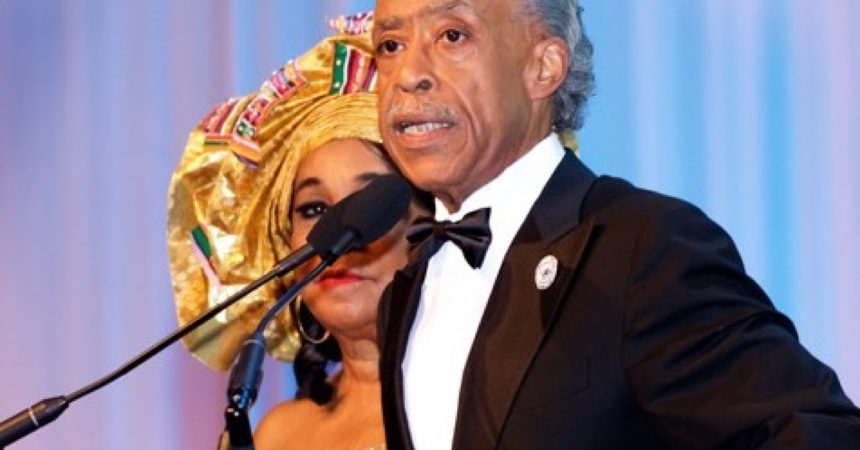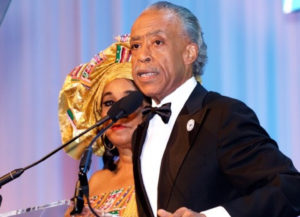
Congressional Black Caucus: Reflecting on years passed, preparing for 2020

Rev. Al Sharpton receives the Harold Washington Award during the CBC-ALC Phoenix Awards dinner. Beside him is the presenter, U. S. Rep. Frederica Wilson
Photo courtesy of Don Baker Photography
By Barrington Salmon
Trice Endey News Wire
Thousands of Black community activists, organizational leaders and political observers descended on the Walter E. Washington Convention Center last week to dive into the Congressional Black Caucus Annual Legislative Conference.
The mood was a mélange of reflection and contemplation about the past and excitement and trepidation about the future. This year’s theme, “400 Years: Our Legacy, Our Possibilities”, suffused throughout the public policy forums, panel discussions and conversations in the convention hallways and corners as registrants, lawmakers, thought leaders and millennials delved into a range of issues and concerns.
“I’m feeling the weight of pride and joy of our struggle on how to make what was professed real in the United States,” said Virginia State Sen. Jennifer McClellan, who won a special election in 2017 held to fill the vacancy left by now Democratic U.S. Rep. Donald McEachin. “The foundation of democracy and all systems we have today were built on the power structure of serving White men. I feel pride, frustration and sadness with how far we’ve come and how far we have yet to go.”
Sen. McClelland was a panelist at the National Town Hall, an event attended by several hundred people, which is viewed as the official opening of the annual legislative conference. Moderated by Johnnetta Cole, chair and seventh president of the National Council of Negro Women, panelists had a vigorous debate that touched on slavery, resistance, reparations, the vital importance of voter mobilization and participation, predatory capitalism, and keys to success in the future.
National Urban League President/CEO Marc H. Morial said African-Americans face an existential crisis generated by a man in the White House who continually adds fuel to a racially toxic environment, utters vile anti-Black racist rhetoric, denigrates African-Americans and people of color and is implementing policies that are antithetical to Black people.
Morial said while Blacks are right to be alarmed, their concerns about the retrenchment of civil rights by the Trump administration and Republican lawmakers must be met with resistance and the use of the ballot box, among a variety of other tools, to effect change.
“Today our progress is under vicious attack as this administration rolls back gains. It is most extreme and potentially dangerous,” he said. “It is an intentional, malicious and diabolic plan taking place in state legislatures. They have had great success implement voter ID restrictions and closing polling stations.”
Morial pointed to the U.S. Supreme Court’s decision in 2013 to strike down a key provision of the landmark 1965 Voting Rights Act.
“Shelby (v Holder) is our Plessy, our Dred Scott,” Morial said, referring to the landmark 1896 Supreme Court ruling that codified that racial segregation in public facilities was constitutional under the “separate but equal” doctrine. It also declared that African-Americans were not and could never be citizens of the United States. “They trick, deceive and thwart our efforts to participate. We have to be ‘woke!’ not tricked and bamboozled.”
Noted economist, columnist and educator Julianne Malveaux agreed.
“Betsy DeVos just gave for-profit colleges a gift (by eliminating rules that protected students from financial abuse). We’re seeing a regulation rollback,” Malveaux said of Education Secretary Betsy DeVos. “This man is eliminating regulations by the minute. He’s normalized poverty and hardship, and we have these melanin-infused buffoons who support him. We need your pushback …”
Derek Johnson, president of the National Association for the Advancement of Colored People, echoed Morial who said he’s tired of talk and that it’s time for action.
“We have to move past rhetoric to action,” Johnson told the audience. “During Freedom Summer, Fannie Lou Hamer, Bob Moses and others focused on getting access to healthcare (for African-Americans), voting rights and education. They renewed the fight to how to leverage the vote. In a democracy, the vote is our currency.”
Johnson reiterated that organizing and mobilizing the Black vote is imperative if Blacks hope to blunt the racist agenda embraced, advocated and codified by Donald Trump. And mobilizing low-frequency voters takes on added importance because the outcome for president will be determined by one or two percent, he added.
Dr. Patrice A. Harris spent much of her time warning about a number of health issues that African-Americans face.
“Black people are more likely to be unwell,” said Dr. Harris, a psychiatrist and the first African-American women to head of the American Medical Association. “African-Americans are sicker, dying at a younger age and dying more of heart disease. There are increasing incidence of suicide and we’re not talking about gun violence. We need to raise conversations about health,” she said. “We have to more fully integrate mental health.”
Harris also addressed the rash of racist-inspired gun violence against Latinos, African-Americans, Muslims and others, perpetrated by young White men and fueled by the Trump Administration.
“Anger and hate are not mental illnesses,” Harris said.
Rev. Al Sharpton, once a presidential candidate himself, received the Harold Washington Award during the CBC-ALC Phoenix Awards dinner. He told the audience that America is now “at a crossroad” with the upcoming 2020 election. He called on voters to “stop this back biting and infighting and jealousy and win this battle once and for all!”
Shantella Sherman told a Trice Edney Newswire reporter that while the planners and organizers did a fabulous job this year as they have in the past, her frustration is that she wants to see more.
“I think for folks who’re uninitiated to the CBC Foundation and this event, they are excited. I’m always excited by new blood and new energy that comes every year, but as a reporter and attendee for the past 20 years, I’m less inspired. I want the rubber to hit the road,” said Sherman, a eugenics and race historian and founder and publisher of ACUMEN Magazine, a historical magazine that fuses history and journalism. “I don’t want to see you talking about the same thing year after year.”
She added, “Everything at CBCF is amazing. But I need an action plan. I didn’t see anything about ‘this is what we’re going to do about this.’ There were far too many extremely intelligent, high-falutin folks with 15 degrees and a home on the hill but can you get your hands dirty to ensure that your kids can vote and that we can hold onto the gains we’ve made?”
Sherman talked about the Gary Plan, which was conceived by original members of the Congressional Black Caucus. It was an action plan calling on the federal government to support a multi-billion program for Black business and economic support, education and housing because CBC members understood that this was a marathon.
“Dr. King was assassinated, other leaders were killed and they wanted to ensure that even if the head was gone, these programs would go on unhindered,” said Sherman, a former editor with The Washington Informer and Philadelphia Tribune newspapers, and the Round Lake News Service.
Educator and Journalist A. Peter Bailey concurred with Sherman.
“I only come these days for a few events,” said Bailey, an associate of Malcolm X, founding member of the Organization of African American Unity and a pallbearer at Minister Malcolm’s funeral. “They’ve gotta start telling people some hard truths. We just recreate horror stories without discussing ways to promote and protect our interests in this world.”







